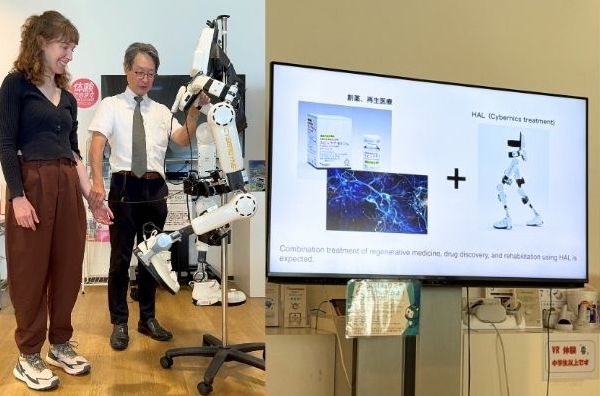Super Aging: UMB Students Learn New Perspectives on Aging in Japan
February 19, 2025 Christianna McCausland
Read about the course that is part of UMB’s master’s in gerontology, a new program that graduated its first students in December 2024, in the latest issue of “CATALYST.”
Photo: At the Robo Care Center in Japan, University of Maryland School of Medicine student Abby Vigderman attached herself to a “cyborg” exoskeleton by placing sensors on her body. She was then able to move the suit simply by thinking about the movement she wanted to make. Photo by Mio Kamijo
Last summer, University of Maryland School of Medicine (UMSOM) neuroscience doctoral student Abby Vigderman was in the Robo Care Center in Japan, where she attached herself to a “cyborg” exoskeleton by placing sensors on her body. She was then able to move the suit simply by thinking about the movement she wanted to make.
“I was floored by this invention,” said Vigderman, who had this in-country experience as a student in the Global Health Aging: Gerontology in Japan course with the University of Maryland School of Graduate Studies (UMSGS). “The company has many examples of how their products have improved the lives of older people and people with movement disorders or degenerative disease.”
The course in Japan is part of UMB’s master’s in gerontology, a new program that will graduate its first students in December 2024. Diane Martin, PhD, MSL, MA, associate professor and director of the Geriatrics and Gerontology Education and Research (GGEAR) program, UMSGS, explains that the MS program will develop culturally competent, knowledgeable practitioners as the United States heads toward having more people over 65 than under 18, known as a super-aged society.
“It’s projected that we’ll have about 74 million people in the U.S. over age 65 by 2030,” Martin said. “The purpose of the MS is to help our students and future professionals to understand the aging process and its uniqueness through a bio-psycho-social-spiritual lens.”
Japan has been a super-aged society for decades and is now the oldest nation on the planet. With fewer young people, it has turned to technology to both fill the void left when there is a smaller youth workforce and to create better quality of life for the aged — hence, the cyborg suit. It also makes it the perfect place to study a different approach to aging.
“We’re an age-segregated society; Japan is an age-integrated society,” Martin said. “We want our students to understand policies countries like Japan have thought about since the ’80s, like: How do we keep our adults engaged in meaningful work? What advances can better the older adult’s ability to age in place?”
Opening Students’ Minds
Given the multidisciplinary nature of UMB and the field of gerontology, the course in Japan is open to students like Vigderman who are not in the MS program. The course begins with three days of intensive learning stateside, including a trip to the University of Maryland BioPark to see how the U.S. is incorporating technology into its aging strategy. In Japan, students travel to the Kanagawa Prefecture, which has adopted a policy of ME-BYO, which complements medicine with more lifestyle-oriented approaches to elder care. Students tour housing complexes and nursing homes, meet with a World Health Organization representative, and tour the Robo Care Center.
“It opens our students’ minds to not using a one-sized-fits-all approach [to care of the aging],” Martin said. While overseas, students from different disciplines — social work, pharmacy, medicine, nursing — work together. “They analyze what they’ve learned based on their interdisciplinary teams, how they would approach something in the U.S., and how they might approach it differently based on what they learned in Japan.”
Read more about the Global Health Aging: Gerontology in Japan course here.
You can read the Fall 2024 issue of CATALYST magazine, which highlights the School of Dentistry's efforts to provide dentures to seniors through a grant program; School of Pharmacy recent graduate Alena Abraham's podcast dedicated to supporting the blind and visually impaired community; Mary Maldarelli, a fellow in Pulmonary and Critical Care Medicine and 2019 School of Medicine graduate using her musical talents to create a therapeutic healing environment; Taofeek K. Owonikoko, MD, PhD, the new executive director of the University of Maryland Marlene and Stewart Greenebaum Comprehensive Cancer Center; and much, much more!